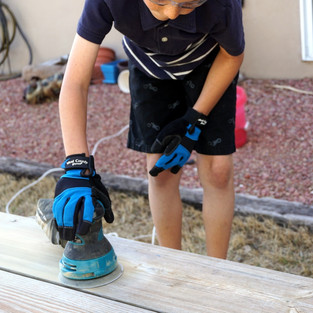Our Homeschool Curriculum for 2019-20 (with a 12-year-old and a 9-year-old)
- Sarah

- Aug 7, 2019
- 12 min read
Updated: Sep 6, 2020
It's August, and that means we'll be starting our new school year soon. Our summer homeschooling was fairly laid-back this year, but in a few weeks we'll dive into new school topics. This post will detail our curriculum and resources for the 2019-20 school year.

Character Comes First
One of the foundational aspects of our homeschool philosophy is the focus on building good character. I believe that teaching my children to be honest, responsible, kind people is more important than the acquisition of academic knowledge, so I focus quite a bit of my efforts on character development. Household responsibilities, read-alouds, service, and relationship development are just some of the ways I focus on character development.
Individual Interests and Needs
An important part of encouraging my children to love learning is encouraging them to pursue their own interests. One of the biggest advantages of homeschooling is that my children have as much time as desired to follow their passions. I'm supporting my children's current interests as follows.
Egg Business
My kids are partners in a small chicken egg business. They work together to take care of the chickens daily, and each earn a small amount of money for every dozen of eggs that are sold. Owning their own business has given my kids the opportunity to learn much about raising and caring for animals, handling and saving money, profit vs. loss, the value of hard work, and long-term commitments. They're becoming experts in management of the flock, and they make the hard decisions about keeping their business viable throughout the productive and unproductive egg laying years of their hens.
12-year-old daughter Alina
Besides chickens, Alina's primary interests are quite unpredictable and eclectic these days. For instance, over the last month Alina's interests have included the following:
dolphins - reading kid-level and adult-level books about dolphins, and then eagerly sharing dolphin facts with me
fascism and other non-ideal forms of government - wondering what it would be like to live under one of these governments, so she read The Wall: Growing Up Behind the Iron Curtain by Peter Sis, Hitler Youth: Growing Up in Hitler's Shadow by Susan Bartoletti, and Animal Farm by Orwell
creating detailed soft sculptures with silly putty
math worksheets - this one caught me off-guard; she spent July 4th and a few days afterwards asking for more and more math worksheets
Lego architecture - learning how to build accurate multi-story houses, complete with furnishings, wall art, and yards
heroes and heroines - especially through graphic-novels such as Rapunzel's Revenge by Shannon Hale, Mighty Jack by Ben Hatke, and Cleopatra in Space by Mike Maihack
This is Love of Learning phase at it's best, and I'm learning to be nimble to make the most of Alina's interest-of-the-moment.
Since Alina is now moving through puberty, she is changing rapidly. She's become more outspoken and strongly-opinionated, but yet also more in-need of tender affection and understanding. I'm supporting Alina in this time of transition by:
learning more about adolescent brain development, which has been enormously helpful in giving me a better understanding of the changes that are happening so that I can better support her (these two books have been amazing: Brain Storm: The Power and Purpose of the Teenage Brain by Daniel Siegel and The Wonder of Girls: Understanding the Hidden Nature of Our Daughters by Michael Gurian),
allowing her to vacillate back and forth between wanting to be more independent and wanting to just stick to our usual routine,
using homeopathic remedies as needed to help re-balance her hormonal and emotional state,
giving her extra one-on-one time to talk through the unaccustomed emotions and changes that are happening.
9-year-old son Ian
Ian has had a lifelong passionate interest in cars, tools, and machines. I support this interest through:
Letting him disassemble old electronics, broken cameras, etc.,
Getting him involved in household maintenance (such as showing him how plumbing works, letting him use the drill and manual staple gun, etc.),
Doing car maintenance so that he has a chance to be involved,
Giving him a Swiss army knife,
Taking the time to stop and let him observe construction sites and vehicles in action, and
Checking out books about machines and cars from the library.
Academic Subjects
I do not push my children academically, but I do purposely give them exposure to plenty of academic subjects and pursuits. My kids are not required to do school; nonetheless, they love engaging with our different curriculum options. You can see an overview of our daily homeschool routine here.
Literature
I read aloud classic books to my children most days. These include both picture books and chapter books with beautiful language, engaging storylines, and memorable characters. Read alouds spark many of our most important discussions about culture and character.
My children also participate in a Read-Aloud Classic Book Club, wherein they discuss books with their friends once a month. Upcoming books for their book club are:
The Incredible Journey by Sheila Burnford
A Little Princess by Frances Hodgson Burnett
Nancy Drew and the Secret of the Old Clock by Carolyn Keene
Charlotte's Web by E.B. White

And we also now have a family tradition where we each listen to a classic audiobook (FREE from Librivox), then discuss the book as a family. We may also watch a movie adaptation to compare with the book. This has been a great way to get my husband involved in our homeschooling, since he can listen to the audiobook during his commute to and from work. Recently, we've listened to:
Anne of Green Gables series by Lucy Maude Montgomery
Little Women by Louisa May Alcott
The Girl on the Boat by P.G. Wodehouse
Silas Marner by George Eliot
Reading
I help set the stage for reading proficiency by reading-aloud often. This allows me to show my children what a wonderful world is hiding between the pages of books. I also make a point of reading on my own frequently; children naturally emulate their parents, so it is important for them to see me engaging in reading and discussing books as part of my own lifelong education.
My 12-year-old daughter Alina is an advanced reader who reads voraciously, so I don't do anything in particular to help her with reading.
My 9-year-old son Ian reached his own natural developmental reading age about 10 months ago. At that time, he suddenly started learning to read very quickly, and has now progressed such that he is reading 6th grade level chapter books. That means Ian has progressed through ~5 reading grade levels in less than a year, almost effortlessly!

Although Ian's reading would have been considered "late" were he in school, thankfully I had learned about the wide range of developmental readiness for reading so that my son did not feel pressured or insecure about his reading progression. Some kids naturally learn to read at very young ages (like my daughter, who was reading Charles Dickens at age 6), but it is totally natural that some kids do not read until later, even until as late as 12 to 14 years old.
Knowing about this gave me the confidence and patience to (mostly) relax and wait for Ian's reading journey to unfold. Now, I can continue to support his natural reading development by making sure to regularly check out new and engaging books from the library, and by making sure there is enough down-time in our schedule during which he can choose to read.
Writing, Spelling, and Typing
We don't use a formal curriculum for writing or spelling. Instead, I try to find ways to incorporate writing into our everyday lives, so that the writing my kids do has real meaning rather than being a forced exercise. There is more about writing in our homeschool here.
Some of the current ways in which I encourage writing are:
I make sure that my children see me writing in my own notebooks on a regular basis. This makes a huge difference in the amount of writing that they choose to do themselves. Most often, I write in my Commonplace book, which helps me really get the most from my own studies.
My children have a few Pen Pals. My children love receiving letters in the mail, so this has been a big motivator for them in practicing their writing frequently.

My kids enjoy doing typing lessons on TypingClub.com. Ian especially enjoys doing typing lessons, and has remarked that these lessons are helping him learn to spell much better.
My kids have email accounts, through which they can communicate with family members. (For security, I set up their email accounts to forward all email they receive to my own email account, so I can monitor what is happening in their accounts.)
Math
I am not using a traditional math curriculum for my children. Rather, they are learning math in the context of everyday life, through games, and through math read-alouds. For more details about how I teach math without a formal curriculum, check out this blog post.
Currently, our favorite resources for math study are:
Sleeping Queens card game, with the addition of a few house rules including being able to get a queen if you can figure out how to make a math equation with all five of your cards,
Monopoly game, where we buy and sell properties, pay rent, manage our finances, and try to accumulate the most wealth (we play a shortened version of this game, and I purposely use it to teach about finances and character in addition to math),
Kahn Academy Math Mission, which my kids are *allowed* to work on once a day for up to 20 minutes,
Life of Fred books, which tell stories about Fred, a 5-year-old math genius who teaches classes at a university (there is a detailed post about how we use Life of Fred books here),
Math worksheets from Math Salamanders and Blacklines Math Practice Books,
Uno card game, which we usually play as Add and Subtract Uno such that players can combine two cards through addition or subtraction to match a number being shown.
Chronological History, Science, and Math? NOT This Year!
The past couple years, we've done a deep dive into history, incorporating chronological science and math along the way. In addition to reading our history "spine" book, I read aloud oodles of supplemental ancient history and middle ages books to increase our learning and engagement in the people and places of history. My kids loved it, and I did too, but change is in the air.
While I had planned to do the same for the 2019-20 school year, I've realized I need to make some adjustments or I'm likely to end up burned out. Our life has gotten busier: I'm working more hours (to try to make up some of the difference since my husband is working less with his chronic illness), my kids have joined more classes, and there is less read-aloud time since both of my kids are often choosing to read their own books.
I created a detailed master plan for history, science, and math, but then realized I was feeling more and more stressed at the thought of actually trying to follow the plan. I choose our homeschool to be driven by joy, not stress. So, I'm giving myself *permission* to take a step back from the chronological history, science, and math plan. Instead, I'll focus on reading aloud from our history "spine" book, and be okay if that is as far as we get! I'm sure there will be a few topics we'll choose to dive a little deeper on, but I'm going to be okay with letting go of the rest.
We're still following a 4-year-cycle for history: Year 1 = Ancient History, Year 2 = Middle Ages, Year 3 = 1600-1850, Year 4 = 1850-modern times. We are currently working through our second iteration of this 4-year cycle. Although I like using Story of the World for Ancient and Middles Ages history, I found that it was too focused on wars, beheadings, and conquests for Year 3.
History is so much more than fighting and strife! I want to focus more on beauty, inventions, and discoveries, and so for Years 3 and 4, I prefer to use history "spine" books from Simply Charlotte Mason. Our main history resources for this year will be the following:

Stories of the Nations, Volume 1 - This book is history told in story-form, focusing on the lives of people, rather than memorization of dates and names. Focusing on world history through explorers, scientific discoveries, and empires.
Stories of America, Volume 1 - This collection of stories details USA history up to 1850, including colonization and the Revolutionary War. This book also interweaves poetry in alongside the historical stories.
The Story of Inventions by Frank Bachman - This book weaves the history of inventions into the life stories of the inventors. We'll read the chapters relating to 1600-1850.
Rand McNally World Wall Map - This beautiful map adorns one of our living room walls and allows us to easily see the regions we are studying.
Replogle Globe - We frequently use our globe to look at the locations of the places we read about in our history lessons, so history lessons become geography lessons as well.
Hands-On Science
This year our hands-on science studies will focus on Chemistry and Nature Study. As part of my plan to scale back our studies, I'll be focusing on history in Fall 2019, and waiting until January 2020 to start our Chemistry studies. Some Chemistry resources we'll dig into include the following:
Chemistry "Living" Books: These books discuss Chemistry through the context of stories about the lives and discoveries of great scientists. I'll be using these books to engage my children's curiosity in Chemistry.
Exploring the World of Chemistry by John Tiner
The Mystery of the Periodic Table by Benjamin Wiker
Periodic Table: I'll use these resources to introduce my kids to the elements of the periodic table.
Periodic Table of Videos (free!)
The Elements by Theodore Gray
Molecules by Theodore Gray
Chemistry Experiments: I have a few different resources lined up and will see which experiments seem to best meet my kids at their current levels of understanding and ability.
Nature Study: Nature Study allows my children to focus their hearts and minds on the beautiful cycles that flow through our outdoor world. When they connect with nature, there is serenity, wonder, and joy. There is more about how we do Nature Study here.
Fruit and Vegetable Garden - My kids learn so much through caring for their own plants in our family vegetable garden. Every year, they each select a few types of plants to grow. They help me amend the soil with compost, and then they plant their seeds and nurture their plants until they reach maturity. Harvesting their own fresh produce gives my kids such joy and a sense of accomplishment.
National Audubon Society Field Guide and Sibley Field Guide to Birds of Western North America - We refer to these books frequently as part of our Nature Study.
Project Feederwatch - My kids love participating in this birdwatching program from Cornell University. To participate, we observe the species and numbers of birds in our backyard about once or twice a month. In addition to reporting the number of birds we see, we are also required to report the weather conditions (low/high temperatures, precipitation, etc).
Spanish
My kids and I are interested in learning Spanish, so I'm finding simple ways that we can learn Spanish in the context of our daily lives.
Common phrases and words charts - I've printed out lists of common phrases and words that we can referenced as needed. To make these more useful, I've taped them to our pantry door, and the kids like referring to them there.
Spanish CD's - We listen to Spanish language CD's at home or in the car. Our favorites have been the conversational Spanish CD's from Pimsleur.
Speaking to each other in Spanish - We practice our Spanish skills by speaking to each other in Spanish at impromptu times. For instance, we often say "buenas noches, hasta manana" at bedtime.
Beauty and Creativity
I incorporate beauty and creativity into our home school in the following ways.
Circle Time
A few times each semester, my children and I have Circle Time, where we sing, dance, and read poetry together. Our poetry book is Favorite Poems Old and New: Selected for Boys and Girls (which is a great compilation of poems about a wide variety of topics including childhood, the seasons, and family). You can read more about our Circle Time here.
Arts and Crafts
I make sure we have plenty of materials on-hand for arts and crafts. In addition to crafts they come up with, I make time to do painting, simple sewing projects, and holiday decorations with my children. Here are some of the resources we currently use for arts and crafts:
The Art of Stone Painting by Bac - This book gives us lots of inspiration for rock painting.
Phenology Wheels - This has been a family project for this year, where we each add one drawing/painting to our wheel per month.
Dover Coloring Books - These detailed coloring books provide us with a simple creative outlet. We especially like using these while listening to audio books.

Kinetic Sand - Kinetic Sand is kinda like sand, except it sticks to itself, never dries out, and is not very messy. My kids have been playing with our Kinetic Sand for years and it still seems like-new! They use it to create bridges, creatures, and freeform shapes.
Pelikan Watercolors - These are not washable, but they are really vibrant compared to the Crayola watercolors we've used in the past.
Low-temperature Hot Glue Gun - My children use the low-temp hot glue gun for making crafts.
Prismacolor Colored Pencils - These high-quality colored pencils were given to my children as a gift, and they are now one of our absolute favorite art supplies. The colors are vibrant and the lead does not break so easily as other brands.
Folk Art Acrylic Paints - We use these to paint rocks, wood, shells, miniatures, and many other crafts.
Music and Theater Appreciation

My children are joining a homeschool band class this Fall. We also attend live concerts and plays, ranging from classical music concerts to holiday concerts to children's plays to Shakespeare plays. We generally attend ~6-8 concerts and/or plays in a year's time. These give us all a chance to cultivate a taste for The Arts.
Each December, we have a music and arts focus, culminating in a small family music recital and A Christmas Carol reading on Christmas Eve.
Physical Education
Physical activity is healthy for us all, so I make a point of getting regular physical activity with my kids. Some of our favorite ways to get physical activity together are:
Walks
Bike and/or scooter rides
Parkour class
Hiking
Swimming
Free Play
Play time is hugely important in brain development. Though we do school work throughout the week, I make sure that there is plenty of time for my children to just play every day. Through their play time, they are able to engage their curiosity, develop their creativity, and learn much about how to interact with each other and their environment.
What changes have you made to your homeschool for the coming year?
Links to Amazon are affiliate links. If you use these links, your price remains the same, but I may earn a small commission. Thanks for supporting this site!





















































Comments